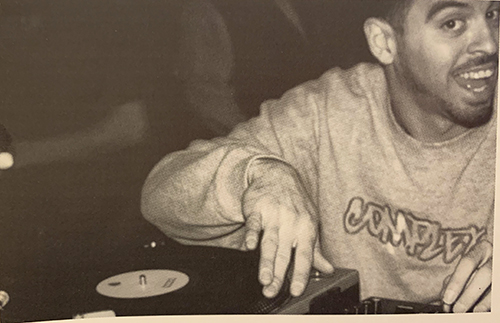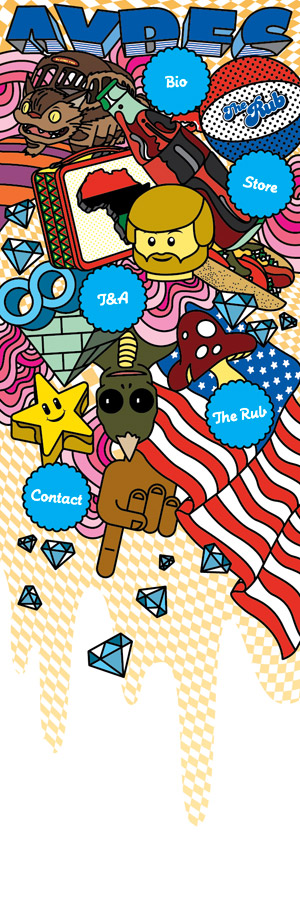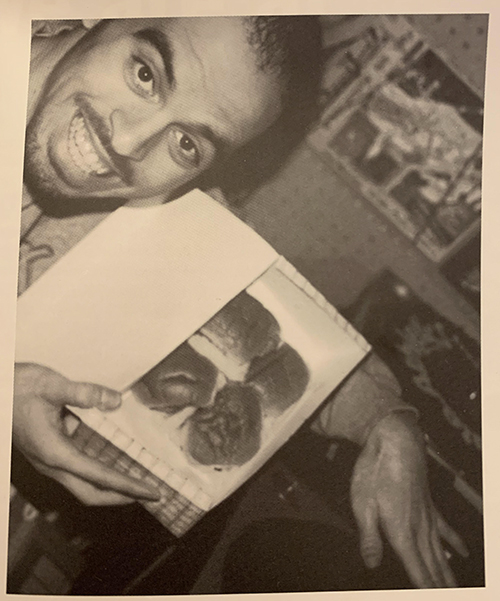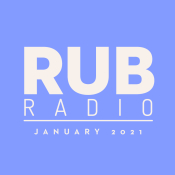
This feature originally ran in Shadowbox Magazine, a hip-hop journal which was only published for one or two issues. Other interviews in the magazine: Gift of Gab, Juggaknots, El-P, ESPO and Medusa. At the time of the interview, Stretch Armstrong had moved on from the Stretch and Bobbito show on WKCR and was spinning on Hot 97, while Bob and Lord Sear continued to play underground music on the CM Famalam show, in the original time slot on WKCR 89.9, Columbia University radio. In 2015, the documentary Stretch and Bobbito: Radio that Changed Lives was released, and in the last few years, Stretch and Bob have been recording an interview show, released as a podcast on Apple Music. You can also keep up with Bobbito on Twitter, he stays busy! Now on to the interview:
When party people go to see Bobbito the Barber spin at a jam, they’d do best to check their expectations at the door. “I bounce all over the place. I like to play shit from the 70s, I like to play shit from the 80s, I like to play shit from the 90s. I like to play shit from 99. When I’m at the club, I really want the people there to have an open mind, and not judge the records by their familiarity, but by their ability to move to them,”
Most famous as host of the seminal Stretch Armstrong Show on WKCR in New York City, Bobbito also owns Fondle ‘Em Records, sells music and clothes at Footwork stores in NYC & Philly, writes a column for Vibe Magazine, and hosts an MC showcase at Nuyorican Poets Cafe. About being voted “Best Hip-Hop Radio Show of All Time” by The Source, Bob says “Me and Stretch and Lord Sear had an incredible run for 8 years, a god blessed 8 years. I don’t know if it was deserved because a lot of their readers don’t remember the shows of the 90s that influenced us.”
Ayres: “Like?”
Bobbito: “The Red Alert shows, the Marley Marl and Pete Rock shows, the Mister Magic shows, the Africa Islam shows, etc. But what me andStretch and Sear were doing was so different from what they did. We took a format and completely stomped on it. We just turned it completely upside down, and I think we changed the way people approached doing hip-hop radio, at least for the nineties decade. I definitely have no problem saying we were the most important hip hop show for the nineties. Especially when you witness the fact that we provided the first opportunity for anybody to hear Nas, Biggie Smalls, Mobb Deep, Black Moon, Mad Skills, and we completely resurrected Kool Keith’s career, Godfather Don’s career; we were the first people to play Souls of Mischief, Artifacts, Company Flow, High and Mighty… all the premier groups of the independent circles were first heard on our show. All the premier groups in the major label circles from New York were premiered on our show. And I hope that a lot of the artists I play now will be the premier artists two or three years from now. On major labels. I think that would be incredible, I hope that happens. There’s a lot of great music that people are missing out on. And it’s a lot different from what’s on radio and video. And the kids that do get to hear it have a special bond with the music because they know the next person on the train doesn’t know who the fuck they’re listening to!”
Do you think you have a lot of power?
“What do you think?” (smiles)
I think you do.
“Of course I do, but I don’t approach it like that. I’m a pretty humble person for the amount of exposure I can give to someone. Stretch used to call me the patron saint of unsigned MCs because if the kid is unsigned, then his best route is to approach me. When I had my Rap Pages column, I really had shit locked – I could write about you, I could put you on the air, and I could put you on the showcase [at Nuyorican Poets]. I don’t look at it as power, I look at it as resources. Because I like helping people. I’m glad I can be in a position to do that. A lot of people now see how much money you can make, and so they go for the big artists. But it’s like I’m not really doing this for the money. It’s nice that I can pay my rent, that I can live off it, but I’ve never had a great desire to be filthy rich. If it happens I’m not going to turn it away, but its not my vision, it’s not my goal.”
Has the independent scene has gotten too big?
“No, it can never get too big. It still caps at 25,000.”
It just seems like a lot of people can get on vinyl.
“Yeah, there’s not as much quality control. In the late eighties, a lot of major labels jumped on the rap bandwagon and there wasn’t much quality control because the people doing A&R weren’t from a hip hop aesthetic, you know, born people, so they would just sign whatever. The same thing is happening now with independents becoming so popular, people just feel like it’s easier to to do it yourself than waiting for someone to sign you. In the early nineties I used to get crazy more demos, now I get crazy more independent releases, whereas if it was six years ago, those cats wouldn’t be pressing their shit up on vinyl, just making cassettes. Which is good in a way because there’s a lot more good records, but its bad in a way because there’s a fucking lot more shit records.”
A lot of independent and freestyle hip-hop is really self-reflexive; (the emcees) are apolitical, they don’t talk about women, they don’t talk about much of anything besides themselves.
“It’s a very insular community. But as with everything else, guys are going to get tired of talking about the same shit. There are a lot of how the pop rap MCs talk about the same independent and unsigned MCs talking about how the pop rap MCs talk about the same thing, and then again all the independent MCS talk about the same thing. Dissing the pop stuff. They’re worse than the pop rappers because they should know better.
It reminds me of news editorials that say “We’re tired of news about Monica Lewinsky.” Then talk about something else!
“Yeah! There’s plenty of other newsworthy stuff out there. Talk about how the Rock Steady Anniversary went. We never get coverage, we get five to seven thousand people from around the globe to gather peacefully. I think that’s a newsworthy story. That it’s been going on for six years without one act of violence.”
Last December [1998], you and Stretch announced that you would no longer be radio partners due to creative differences. Did the split come because he played more Queensbridge, thugged-out rap, and you played more demo tapes?
“That was definitely part of it, he has a penchant for those records. I like a lot of Queensbridge stuff too. I love Mobb Deep and Capone ‘N Noreaga, it’s just not the only thing I like, and continually the artists Stretch would want to book would be that type of artists, and continually I wanted to book the bugged-out, funny, or left-field lyricist type of kids. The kids Stretch has a disdain for, he’d call them the backpack kids. So I would want to bring up Siah and Yeshua da poED and he hates them. And he would want to book acts like The Sporty Thieves… they were cool kids and I liked the instrumental, but lyrically I wasn’t crazy about them. And based on lyrics, which is what is being presented when they come up to the show, I didn’t feel like they were a group that should come up. So we kept going through those types of tugs of war. And what would happen would be that Stretch wouldn’t be there, and he wouldn’t like the stuff I would spin, but I wouldn’t have spun it if he was there.”
“If you know the history of our show, in the early years I would have some advance or demo and I would be like, ‘Stretch, I wanna throw this on’ and he would be like, ‘yeah, go ahead.’ Around 95 he started not liking a lot of the stuff that I liked, so he would just be like, ‘nah, I don’t wanna play it, I don’t want it to be played while I’m here,’ and he started missing the show so often. So I would hold on to the demos, freestyles, and unreleased shit, and the little independent records that I had. Then when he wasn’t there, I would go on and play my shit, and it would be so different from what he would present that listeners started to sense an imbalance between my interests and his interests. And he used to worry that people thought he like Company Flow, or that he liked Juggaknots, the really left field cats, and that’s what it boiled down to. Like, ‘yo, I’m not too crazy about the shit you’re playing and you’re not too crazy about the shit I’m playing.’ It was just the best for both of us, really, and I think for the listeners too, you know. I know there are some kids that listen to Stretch and hate the shit that I play, and there are some kids that hate the shit that Stretch plays. And there are a lot of kids that love both of us. I’ve been having a lot of fun doing the show with Sear, y’know, I’m not sentimental about doing the show with Stretch…”
Don’t you miss the jokes?
“Me and Sear still joke around a lot, we just don’t have someone with a big nose to joke about.” (Laughs)
Did you ever feel awkward substituting for as nice a DJ as Stretch?
“I always felt like the show had to go on, you know what I mean, and I will not front, I started saying “this is my man Cucumber Slice’ on the radio ’cause I didn’t want nobody to know who Cucumber Slice was, ’cause I sucked. Still to this day I don’t feel like I’m up to par as a radio DJ. Definitely early on I would say, ‘DJ Cucumber Slice is on the mix’because I know if I did a train wreck mix it was too embarrassing to let people know it was me. So when I started getting better at blending I would be like, ‘yo, I’m Cucumber Slice. I was proud enough to say it.”
As his skills developed, Bobbito began to spin parties with a lot greater frequency. But it’s not always easy to rock parties with the records he likes:
“Hip hop is very accessible to people right now, there’s not a lot of people who want to search to hear new music; people go to a club and want to her what’s familiar to them. To me, I have a completely different orientation. I go to a club and I want to hear something I don’t know, I want to go to the DJ and ask him ‘what the fuck are you playing?’ To me, I get a rush when I don’t know the record.”
From a dancer’s point of view?
“From a dancer’s point of view and from a DJ’s point of view. I don’t know if I’m a throwback. When I first started to go to clubs in the eighties, a lot of the songs you heard at the clubs you wouldn’t hear on the radio. That was the whole reason you went to the clubs, as an alternative to the radio. Now clubs are very similar to what’s being played on the radio. Radio affects clubs, but in the 80’s, clubs affected radio. ‘It Takes Two’ was a big record in the club way before commercial radio picked up on it. It’s weird man, every time I spin I’m never
able to hold gigs for more than a couple of months. Either the owner complains because the crowd doesn’t drink enough… you know, cause they’re more like a dancey crowd, or the progressive people don’t come out as much. I’ll be playing progressive records, like album cuts and b-sides, people just don’t respond. I can’t hold a gig. I don’t rely on djing to pay my rent so I can take chances like that. As with the radio show, it took a long time to build a loyal following, I think what I’ve been trying to cultivate as a club DJ will take a long time, but I can feel it happening. When people see me on the street they’re like ‘yo, when is the next time you’re spinning, where are you djing?’ I’m getting a lot of party gigs, a lot out of state and out of country. So I’m starting to feel like there are people out there who appreciate when I play “Youthful Expression’ instead of ‘Can I Kick It’ or play the remix to ‘They Reminisce Over You’ instead of the album version or… whatever other crazy shit I fucking play.”
I remember seeing you play at 2I’s a few years ago…
“2I’s was fun.”
It was a lot of fun.
“People are still talking about that, and that is a perfect example. People were complaining, the owner wasn’t feeling it and he asked me to change my music and I said no, so he said that’s it then, and I said alright.”
To go to a club and hear soul and dance jazz at the beginning of the night, and work it up to old school b-boy records at the end, you don’t hear that much.
“That’s another thing, every time I spin I always try to spin b-boy records cause I’m a member of Rocksteady Crew, I don’t feel comfortable playing a hip hop party and not playing b-boy records. You know what I’m saying, it’s like buying a Playboy and there’s no naked women in there, it’s retarded.”
A lot of underground mcs are making records that reminisce about hip hop in the eighties, like the Arsonists’ “Flashback,” Common’s “Like They Used to Say,” and All Natural’s “Hip Hop History 101.” The Roots, Mos Def, there are so many examples. Can new hip hop capture the energy of the 80’s?
“Of course, I don’t even think it has to try, it does. When good records are made, it captures the energy of any time period of hip-hop. A group like the Arsonists that’s very live performance and melody-oriented is gonna catch the vibe of that period because most of the records that came out then really had no other purpose than to play out at a party, so the records that came out then were party records. In the eighties, people weren’t there in the clubs to be seen, they weren’t there just to bob their heads, they were there to dance. Specifically they were there to be on the train at 4:30 in the morning, drenched in sweat when it was like 15 degrees outside.”
Stretch and Bobbito: Radio That Changed Lives from Saboteur Media on Vimeo.




